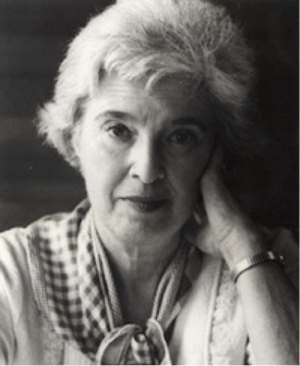Saluting Gerda Lerner as Women’s History Month Begins
Back in the day (as we now say) when I was an undergraduate at a college that had been educating the country’s elite—all men, of course—for almost 350 years, the first ripples of Second Wave feminism were stirring things up outside the ivy covered walls. Inside, in a classroom filled entirely with women, an untenured (but well-published) female Senior Lecturer was teaching the institution’s first course on women’s history.
One of the books on the syllabus was The Grimke Sisters from South Carolina: Pioneers for Women’s Rights and Abolition, published in 1967. The paperback I still have on my shelf was brand new in 1971; it had an endorsement from Gloria Steinem on the cover: “These are the pioneers of Women’s Liberation—an indispensable book for all those tired of reading history written for and about men.”
The author was Gerda Lerner, an Austrian-born Jewish immigrant to the U.S. who began her college career when she was a 38-year-old mother of two and received her Ph.D. from Columbia at the age of 46. Many years later, she explained that “as I entered academic life as a student, I encountered a world of ‘significant knowledge,’ in which women seemed not to exist.”
“In my courses, the teachers told me about a world in which ostensibly one-half the human race is doing everything significant and the other half doesn’t exist,” she remembered in a 1993 interview with The Chicago Tribune. “I asked myself how this checked against my own life experience.” Never one to mince words, she said, “This is garbage; this is not the world in which I have lived.”
For Gerda Lerner, it was a matter of profound importance that the world in which she—and all women—lived was reflected in what was studied and taught. It was a simple matter: “Women’s history is women’s right,” she declared.
After graduate school, she got a job teaching at Sarah Lawrence College in Bronxville, New York, and in 1972, she founded the nation’s first M.A. program in women’s history there. As Joyce Antler wrote when Gerda Lerner died in January, over the next 40 years, “no historian was more identified with the field of women’s history.” We have just added a page about this remarkable woman to “We Remember,” the section of JWA’s website devoted to American Jewish women who have had an impact on and beyond their community.
Elsewhere on JWA:
- Jewesses with Attitude: Remembering Gerda Lerner: The "Mother" of Women's History
- Encyclopedia of Jewish Women: Gerda Lerner
- Statement for Feminism exhibit: Jewish Women and the Feminist Revolution
It’s fitting that the first post in March be about Gerda Lerner, since she was instrumental in organizing the first “Women's History Week” in 1979. Congress authorized the national celebration in 1982. In 1987, the National Women’s History Project successfully petitioned Congress to designate the month of March 1987 as “Women’s History Month."
JWA is marking Women’s History Month 2013 with a series of blog posts on women whose stories may surprise you—the writer and star of “Portlandia,” Wyatt Earp’s common law wife, the 22-year-old who wrote women’s rights into Japan’s post-war constitution … Who knew they were Jewish? We invite you to help us celebrate Women’s History Month by sending us a few paragraphs about an American Jewish woman whom you would like to introduce to other readers of “Jewesses with Attitude.”






